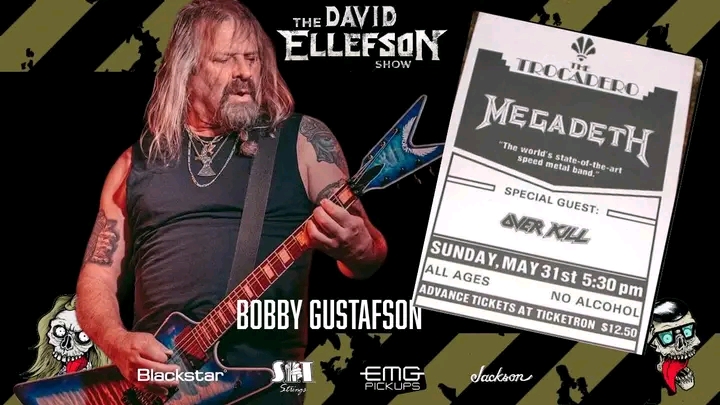This week, former Overkill guitarist Bobby Gustafson sat down with hosts David and Joshua for a long-form, no-holds-barred conversation that pulled back the curtain on one of thrash metal’s most compelling and sometimes overlooked careers. Known for his groundbreaking riffs and pivotal role in shaping Overkill’s early sound, Gustafson offered fans a rare, unfiltered look at his musical journey, from his teenage beginnings to the high-stakes world of touring with some of the genre’s biggest names to….
Bobby Gustafson Opens Up on Career, Overkill Days, and Turning Down Megadeth Offer in Candid New Interview….
This week, former Overkill guitarist Bobby Gustafson sat down with hosts David and Joshua for a long-form, no-holds-barred conversation that pulled back the curtain on one of thrash metal’s most compelling and sometimes overlooked careers. Known for his groundbreaking riffs and pivotal role in shaping Overkill’s early sound, Gustafson offered fans a rare, unfiltered look at his musical journey, from his teenage beginnings to the high-stakes world of touring with some of the genre’s biggest names.
Gustafson began by recalling his early entry into Overkill, joining the band at just 17 years old. At a time when the New Jersey thrash scene was still defining itself, his talent and drive quickly became clear. He played a central role in securing the band’s deal with Megaforce Records, the iconic label that also launched Metallica, Anthrax, and Testament. For Gustafson, the Megaforce signing wasn’t just a career milestone — it was validation that his passion and relentless pursuit of heavy music were paying off.
The conversation took a particularly fascinating turn as Gustafson recounted touring with Megadeth during their groundbreaking Peace Sells… But Who’s Buying? tour. While fans around the world saw the fiery energy of the band onstage, Gustafson had a front-row seat to the internal tensions behind the scenes. He vividly described the explosive confrontation between frontman Dave Mustaine and drummer Gar Samuelson, an argument that ultimately led to Samuelson’s departure. For listeners, the story offered a dramatic reminder of the volatile chemistry that fueled thrash metal’s greatest bands — and sometimes tore them apart.
In one of the interview’s most jaw-dropping revelations, Gustafson revealed that Mustaine once offered him a spot in Megadeth. At a time when Megadeth was cementing its legacy as one of the genre’s “Big Four,” the invitation could have been a career-altering moment. Yet, Gustafson explained that he ultimately turned down the offer. While the decision may surprise fans today, his reasoning was rooted in loyalty to his own path and his commitment to the projects he was already building. It was a rare glimpse into the difficult choices musicians face behind the scenes — balancing ambition with personal integrity.
Beyond Overkill and Megadeth, Gustafson reflected on his time with other notable bands, including Skrew and Vio-lence. Each chapter of his career, he explained, brought unique challenges and opportunities for growth. With Skrew, he ventured into the industrial metal scene, exploring heavier and more experimental sounds. His work with Vio-lence reconnected him with the raw thrash energy he helped pioneer. Through it all, Gustafson emphasized that his passion for heavy music has remained the driving force behind every project he’s taken on.
What made this conversation stand out was Gustafson’s candor. Rather than sticking to the polished version of his story, he spoke openly about the highs and lows, the missed opportunities and the triumphant moments. For fans of thrash metal, the interview not only shed light on an important figure in the scene but also highlighted the broader reality of what it means to navigate a career in such an intense, ever-changing industry.
As Overkill continues its legacy with new generations of fans and Megadeth carries on as a cornerstone of heavy metal history, Bobby Gustafson’s story stands as a testament to the unsung architects of the genre. His riffs, decisions, and experiences may not always be front-page material, but they remain vital threads in the tapestry of thrash. For longtime fans and newcomers alike, his words offered both a history lesson and an inspiration: that staying true to one’s vision can be as powerful as any spotlight.
Would you like me to make this read more like a music magazine feature (with a bit more storytelling flair and fan-centered excitement), or keep it strictly straight news report style.
